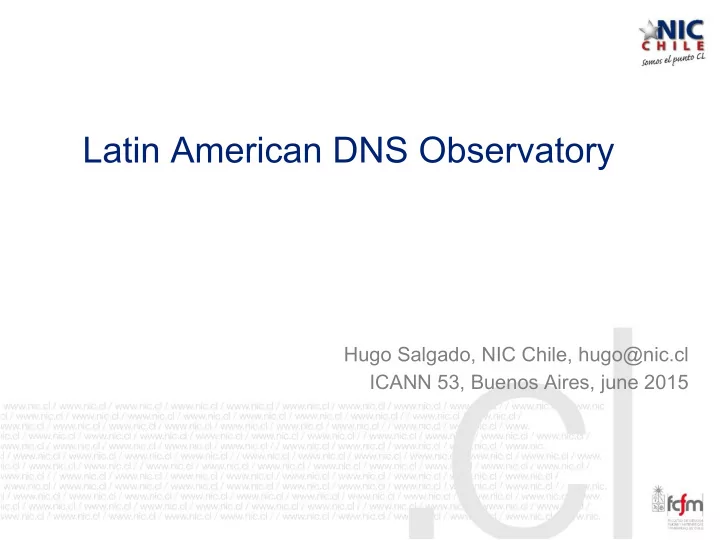

Latin American DNS Observatory Hugo Salgado, NIC Chile, hugo@nic.cl ICANN 53, Buenos Aires, june 2015
History • LAC Strategic Plan 2013-2016 • Experience on “Observatorio de Resiliencia de .CL” – L’Observatoire sur la résilience de l’Internet français • Working group: – Alejandro Acosta, LACNIC – Victor Fernandes & Antonio Alberti (Brasil) – Juan Manuel Rojas (Colombia) – Hugo Salgado, NIC Chile 2
Resilience in DNS • What do we mean by 'resilience' ? Capacity of keeping an adecuate level of service in front of failures or unexpected events • Scenarios – Natural disasters – Excessive overload – Malicious events (attacks) 3
Resilience in Internet • DNS does not exist in a void • There are others layers above and below DNS that can and do affect its behavior – Physical interconection • Wires, fibers, datacenters, antennas. – Routing • BGP, routing stability (critical for anycast operation) – DNS software – Mission-critical applications that depend on the DNS • All things web • Instant messaging • e-mail 4
“Observatorio Latam del DNS” • Reference point for technical measurements • Goals – Improve know-how among all involved – Measure the speed of change • How fast are new things implemented ? – Standards compliance – Application of best practices – Promote cooperation between stakeholders • Twice-yearly reports 5
Measurements • Both active and passive measurements • Performed in a periodic and systematic way • Performed by monitors or probes installed in strategic places • Deliver reports, trends and and provide recommendations to the community 6
Initial Metrics (1/2) • Topology of authoritative servers – Number of NS per zone – Diversity of IP blocks / ASN • Standards compliance – EDNS – Malformed queries – TCP support 7
First Metrics (2/2) • Common vulnerability check – Random ports – Adequately deny recursion • Development of new technologies – DNSSEC – IPv6 adoption 8
Next steps • Installation of first monitor and begin first active measurements • Cooperation with CcTLDs – Use of domain rankings (Alexa, etc.) • First report in 2016 • Future: – Active measurements – Reports “a la carte” 9
Gracias 10
Recommend
More recommend